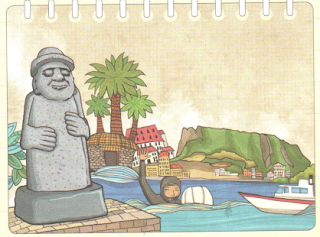제주도 – 흔히 제주도에는 3가지가 많다고 합니다.
There’re three things that are plentiful in Jeju.
그것은 바로 ‘바람, 돌, 여자’입니다. 이것 중에서 ‘여자가 많다’라는 것이 무슨 뜻일까요? 이것은 과거에 제주의 남자들이 바다에서 조난되거나 사망하는 경우가 많아서 여자가 수적으로 많았던 것에서 시작된 말입니다. 하지만 사실 이런 이유보다 제주의 환경상 여자들도 일터로 나오지 않으면 안 되었던 데서 ‘여자가 많은 제주도’라고 불리는 것입니다. 남자들처럼 험한 바다로 나가서 일하는 ‘해녀 ‘야말로 제주도의 자연 환경과 문화를 동시에 나타내는 문화라고 할 수 있습니다.
They are “Wind, Stones, and Women.” And what’s the meaning of plenty of women?” It was said that in the past there were many cases of men being injured or killed in the sea. So population-wise, there were more single women around. But the truth is that women couldn’t help working on the island because of their tough situation, and people said there are “plenty of women on Jeju Island.” “Haenyeo,” who works in the sea like men could be the symbol of Jeju, representing the island’s natural seaside culture.
그렇다면 제주도에 없는 3가지는 무엇일까요? 도둑, 거지, 대문’이라고 합니다. 제주도 사람들은 평소 근면 절약하고 상부상조하는 삶을 이루기 때문에 대문도 필요없다고 합니다. 만일 집 주인이 없을 경우에는 사람이 없다는 표시로 집 입구에 긴 나무를 걸쳐두면 됩니다. 이것이 바로 제주의 ‘정낭’입니다.
Which three things are not available on Jeju Island? They are thieves, beggars, and a front gate. People who live on Jeju usually are hard-working people who are willing to help each other out, so they don’t need a front gate. If the owner of the home is out, he or she only needs to hang a long wooden stick on the front door, indicating a vacancy. This is the “Jeong nang” of Jeju. This shows that honesty and trust have always been prevalent throughout the island community.

